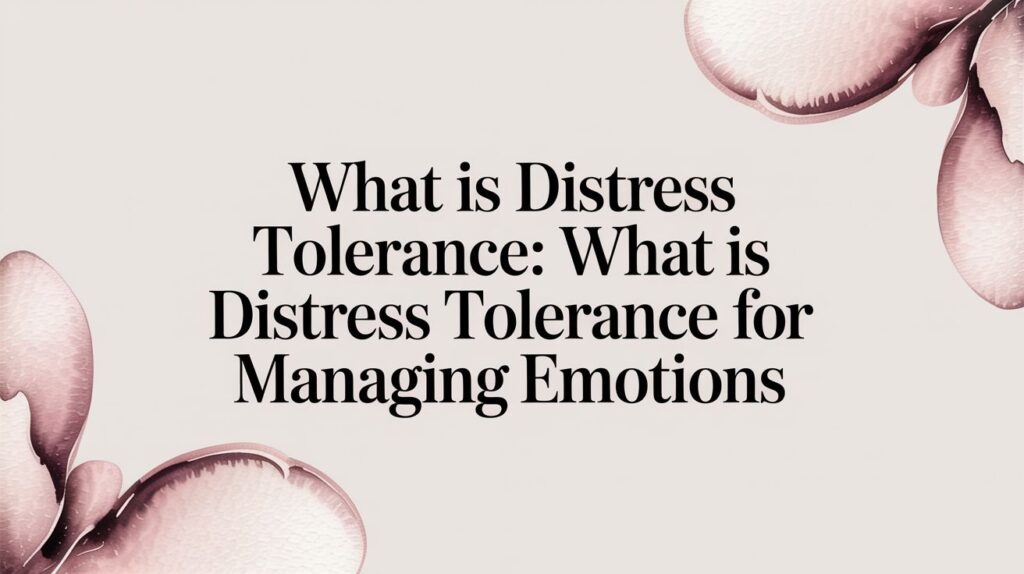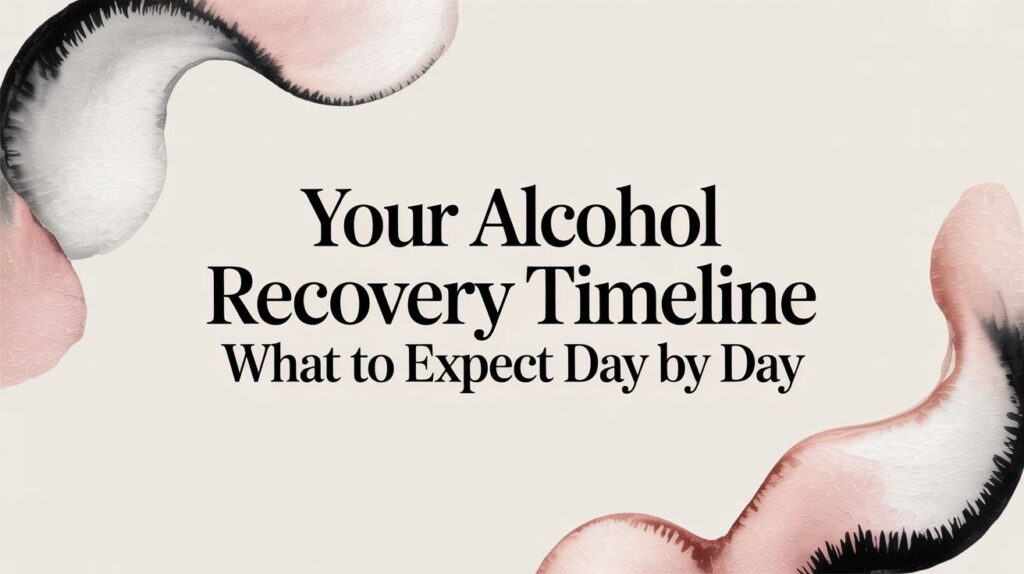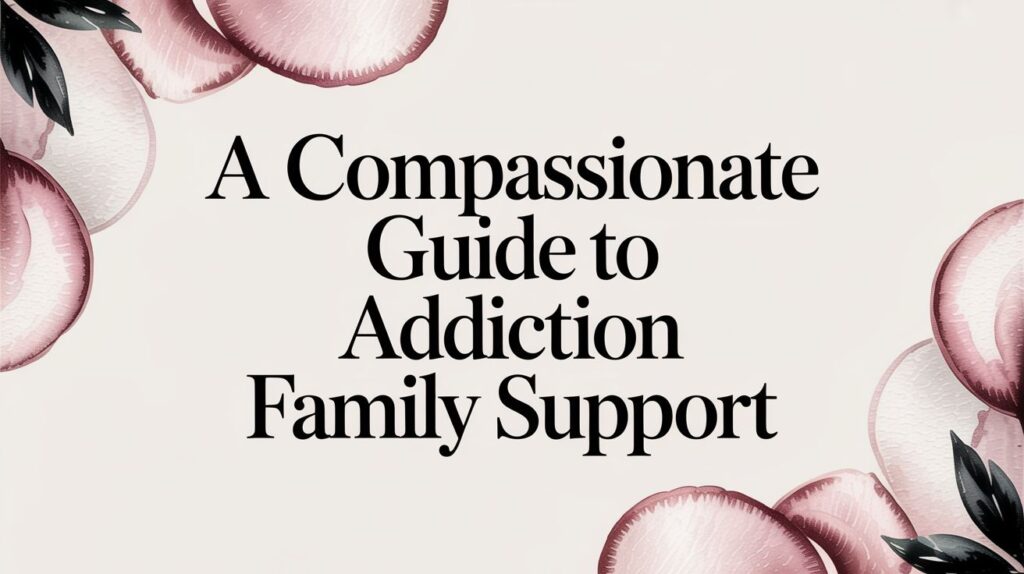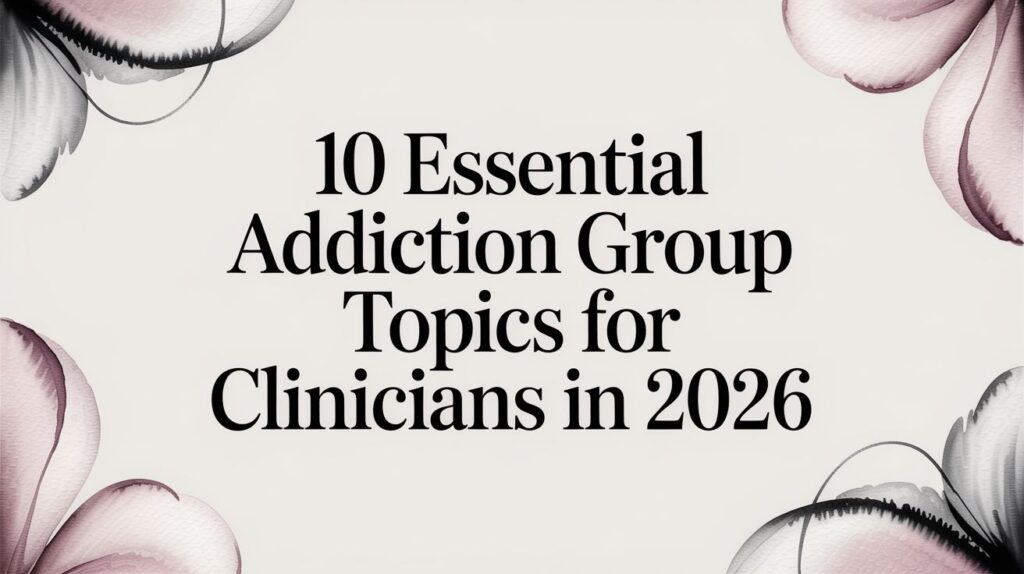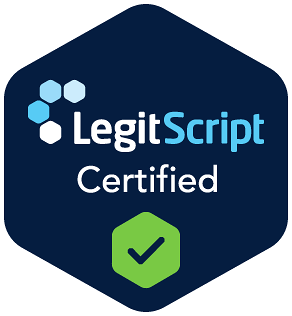Rehabilitation, often just called rehab, is a structured path designed to help people get a handle on addiction and mental health struggles. Think of it less like a hospital and more like a workshop for rebuilding your life. It’s a guided process, much like restoring a classic car, that gives you the tools, support, and time needed to get back on the road—stronger than before.
Understanding the True Purpose of Rehab
When most people hear "rehab," their minds jump to a place of crisis, a last resort. But that picture is incomplete. The reality is far more hopeful and empowering. Rehabilitation isn't about punishment; it’s a supportive, evidence-based process that opens the door to deep healing and genuine personal growth.
It’s about more than just stopping the use of a substance. The real work is in untangling the web of physical, psychological, and social threads that contribute to addiction in the first place.
The core mission of rehab is to equip you with the practical tools for a new way of living. This isn't abstract theory—it's hands-on work. It involves:
- Identifying Root Causes: Therapists help you dig into the why behind the behavior. Are you self-medicating for trauma, anxiety, or chronic stress? Uncovering these underlying issues is the first step toward healing them.
- Developing Coping Skills: You’ll learn healthy, real-world strategies to manage cravings, navigate triggers, and handle life’s curveballs without falling back on old habits.
- Building a Support System: Rehab connects you with professionals and peers who actually get it. This sense of community provides the encouragement and accountability that are so critical for staying on track.
More Than a Program—It’s a Path to Wellness
It’s best to see rehab as the foundational phase of a lifelong recovery journey. It offers a safe, structured environment where you can hit pause on the outside world and focus completely on your well-being. Think of it as a protected space to break old cycles and build new, healthier routines that will stick with you long after the program ends.
And the need for this kind of support is staggering. Globally, rehabilitation is a critical health service for a huge portion of the population. A landmark study revealed that in 2019, an estimated 2.41 billion people required some form of rehabilitation, a jaw-dropping 63% increase since 1990. This makes it crystal clear that rehab isn't some niche service; it's a fundamental part of modern healthcare. You can dig into these global health findings directly from the World Health Organization.
Ultimately, the goal isn’t just about getting sober. It's about a complete restoration of wellness—empowering you to build a fulfilling, stable, and healthy life where you are back in the driver's seat.
Making the choice to enter a rehab program is a courageous and powerful first step. It’s a true investment in yourself and your future, one that opens the door to lasting change and restored hope.
Navigating Your Treatment Options
Okay, so you’ve decided to get help. That’s a huge first step. The next question is, what does "help" actually look like? Just like there are different roads to the same destination, addiction treatment isn't a single path—it's a spectrum of care designed to meet you where you are.
Figuring out the right fit is everything. The main fork in the road is between inpatient care, where you live at the treatment center, and outpatient care, where you live at home and come in for scheduled therapy. Each one offers a different level of structure, intensity, and independence.
This image gives you a quick visual breakdown of how these programs fit together.
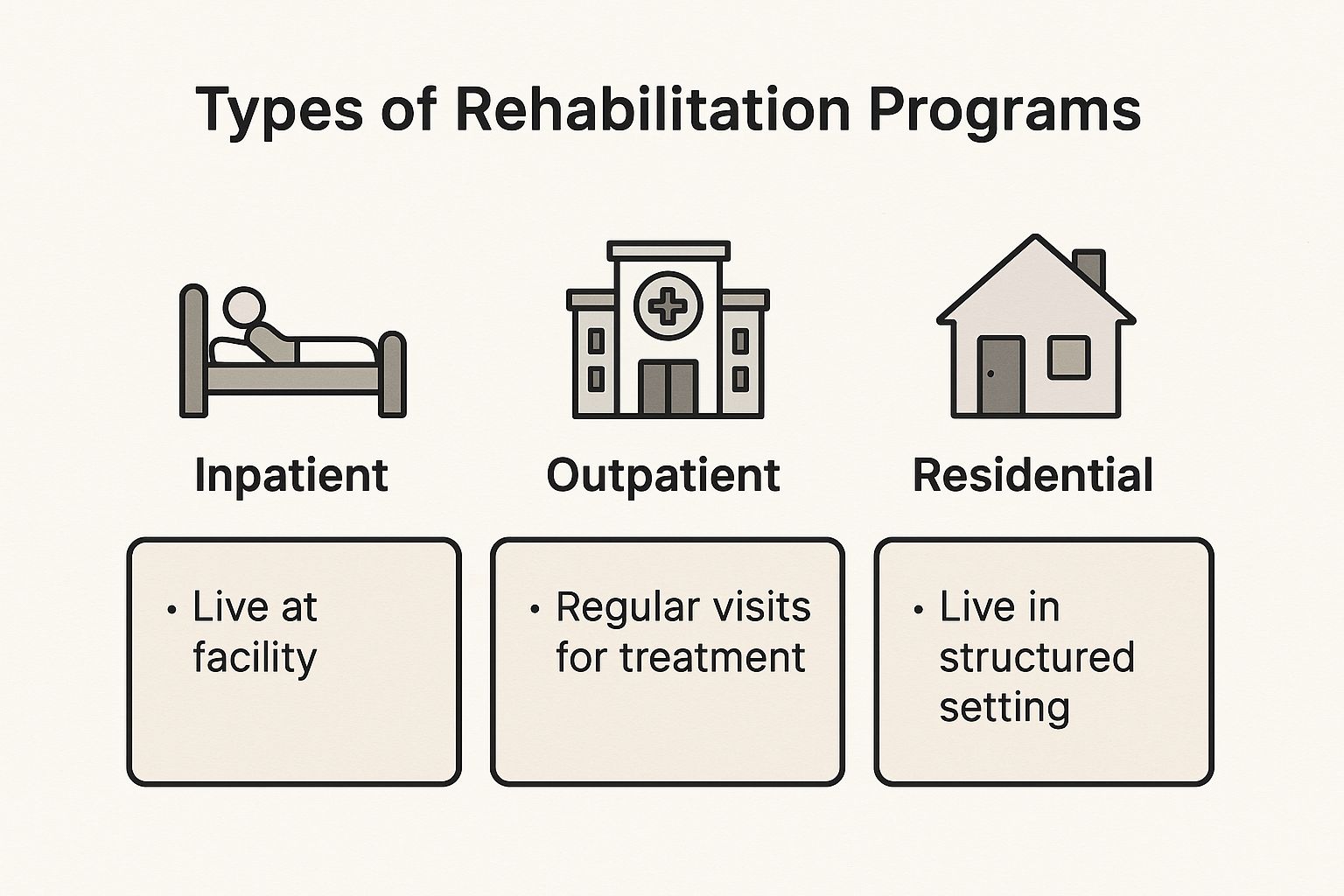
As you can see, treatment isn't an all-or-nothing deal. It's about finding the right balance of support and real-world freedom for your specific situation.
Inpatient Rehab: The Immersive Approach
Inpatient rehabilitation, which you’ll often hear called residential treatment, is the most intensive level of care you can get. Here, you live at the facility 24/7 for a set period, usually somewhere between 30 to 90 days. Think of it as hitting the pause button on life to create a protected space where your only job is to heal, away from the triggers and stresses of your daily environment.
This all-in model is a game-changer for people who:
- Need a completely stable, substance-free environment to get their footing.
- Require medical supervision, especially for a safe and managed detox.
- Are dealing with co-occurring mental health conditions that need intensive, simultaneous care.
The days are highly structured with individual therapy, group sessions, and educational workshops. This round-the-clock support is designed to build a rock-solid foundation for sobriety from the ground up.
Outpatient Rehab: Flexible and Integrated Care
On the other side of the coin is outpatient rehabilitation. This approach offers top-tier treatment with the flexibility to keep up with your life—work, school, and family. You live at home and travel to the center for therapy sessions on a schedule that works for you.
This is a fantastic option for individuals who have a supportive home environment and are motivated to do the work. It’s also an essential next step for those leaving an inpatient program, allowing them to ease back into daily life with a safety net of continued support.
Outpatient care isn't a "lighter" or "lesser" version of rehab. It's a different approach for a different set of needs. It’s designed to help you take the skills you learn in therapy and apply them directly to real-world challenges, day in and day out.
Within outpatient care, there are a couple of different intensity levels.
Bridging the Gap: PHP and IOP
Sitting between the 24/7 structure of inpatient rehab and standard weekly therapy, you’ll find two powerful options that offer a middle ground.
- Partial Hospitalization Programs (PHP): This is the most structured type of outpatient care. You’ll attend treatment for several hours a day, five to seven days a week. It offers a level of support and daily routine that’s very similar to a residential program, just without the overnight stay.
- Intensive Outpatient Programs (IOP): An IOP is a slight step down in time commitment from a PHP. It typically involves meeting for a few hours a day, three to five days a week. This gives you robust clinical support while leaving more room for your work or family schedule.
These programs, like the ones we offer at Altura Recovery, are designed to give you a strong support system as you learn to navigate early recovery. They serve as a critical bridge, making sure you have the professional guidance you need to build lasting resilience.
Comparing Inpatient vs. Outpatient Rehab Programs
Choosing the right starting point is one of the most important decisions you'll make. This table breaks down the key differences between inpatient and outpatient approaches to help you see which one might be the best fit for your journey.
| Feature | Inpatient (Residential) Rehab | Outpatient Rehab (including IOP/PHP) |
|---|---|---|
| Living Situation | Reside at the treatment facility 24/7 | Live at home and commute to the facility |
| Environment | Highly structured, controlled, and immersive | Real-world setting with daily challenges |
| Time Commitment | Full-time, 24/7 for 30-90+ days | Part-time, ranging from 9 to 20+ hours weekly |
| Best For | Severe addiction, co-occurring disorders, or unstable home life | Mild to moderate addiction, strong support system, work/family duties |
| Support Level | Constant medical and clinical supervision | Scheduled support with access to help between sessions |
| Focus | Building foundational skills in a protected setting | Applying recovery skills to everyday life situations |
Ultimately, there's no single "best" option—only the best option for you. Understanding these distinctions allows you to make an informed choice that aligns with your personal needs, responsibilities, and recovery goals.
A Look Inside the Rehab Experience
The idea of walking into a rehab facility can feel incredibly overwhelming, mostly because of the unknown. Let's pull back the curtain on the day-to-day experience to replace that anxiety with a clear, reassuring picture of what you can expect. This isn’t a place of judgment; it's a structured, supportive environment designed entirely around your healing.
Your journey begins the moment you arrive—not with therapy, but with a warm welcome and a thorough intake process. This first step is all about building a solid foundation for your recovery.
The First Step: Intake and Assessment
The initial phase is about getting to know you as a whole person, not just your addiction. A dedicated clinical team will meet with you to conduct a comprehensive assessment.
This evaluation goes deep, covering your substance use history, physical and mental health background, and your unique life circumstances. Think of it as creating a detailed map of where you are right now.
That information is then used to design a personalized treatment plan—a specific roadmap for your recovery. No two journeys are the same, so no two treatment plans should be, either. This customized approach ensures the therapy and support you receive directly address your needs, challenges, and goals, setting you up for more effective healing from day one.
Core Therapeutic Methods You Will Encounter
Once your plan is in place, you’ll dive into the heart of the rehab experience: therapy. Treatment centers use evidence-based methods proven to help people build lasting sobriety. You'll engage in a few different types of therapy, each with a unique purpose, that work together to create a strong foundation for recovery.
Here are the main therapeutic models you'll likely encounter:
- Individual Therapy: This is your one-on-one time with a dedicated counselor. In these private sessions, you can safely explore the root causes of your addiction, work through personal trauma, and develop specific coping strategies.
- Group Therapy: In a group setting, you'll share experiences and learn from peers who genuinely get what you're going through. This process builds a powerful sense of community, crushes feelings of isolation, and provides gentle accountability.
- Family Therapy: Addiction impacts the entire family. These sessions bring loved ones into the healing process to repair relationships, improve communication, and create a stronger support system for when you return home.
These therapeutic pillars are often supplemented with specialized approaches to address the mechanics of addiction itself.
Building New Skills for a New Life
A huge part of rehab is learning how to think and behave differently. Therapies like Cognitive Behavioral Therapy (CBT) are fundamental to this process. CBT is a practical, goal-oriented approach that helps you identify and change the destructive thinking patterns and behaviors that fuel addiction.
For example, through CBT, you might learn to recognize an internal trigger, like a wave of stress. Instead of automatically thinking about using, you'll practice a new, healthy coping skill you’ve learned—maybe a mindfulness exercise or calling a sponsor. It’s about actively rewiring your brain’s response to life's challenges.
Rehab is not just about removing a substance; it's about adding new skills, perspectives, and supports. It's an active process of building the life you want, brick by brick, in a safe and structured environment.
In addition to core therapies, your days will be structured with educational workshops, wellness activities like yoga or meditation, and skills training. These activities are designed to heal the whole person—mind, body, and spirit. From learning about the science of addiction to developing healthier nutritional habits, every part of the program is designed to equip you with the tools you need to thrive in long-term recovery.
Why Aftercare Is Key to Long-Term Success
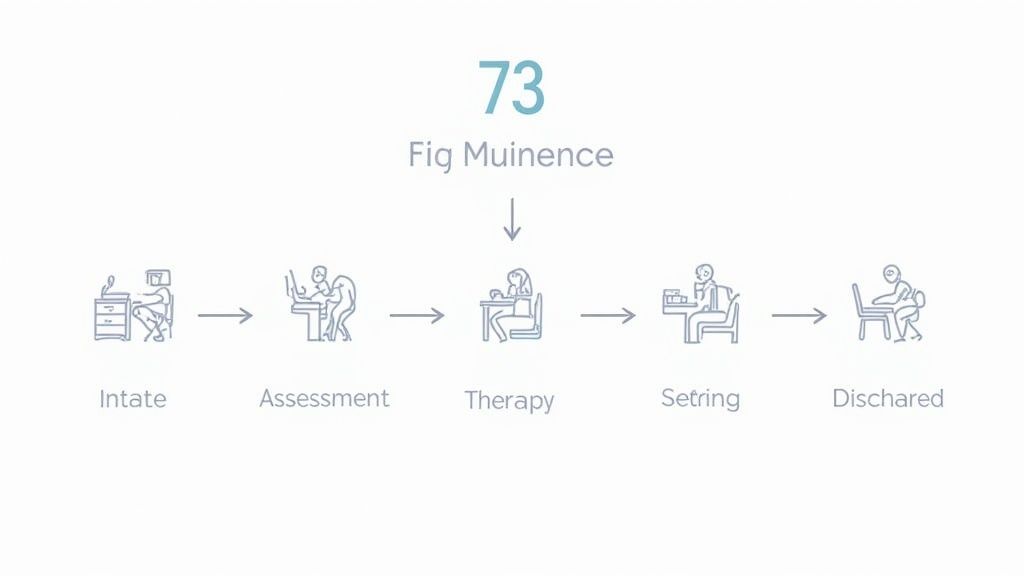
Finishing a rehab program is a huge accomplishment, and it deserves to be celebrated. But it’s a mistake to see it as the finish line. In reality, it’s the starting line for the rest of your recovery journey. The skills you learned in treatment are the foundation—now it's time to build on them.
Think of it like this: rehab is where you learn the playbook. Aftercare is where you practice the plays in a real game, with a coach on the sidelines to guide you. It's the ongoing support system that helps you handle real-world challenges and reinforce those new, healthy habits long after you’ve left the structured environment of a treatment center.
Building Your Recovery Safety Net
Stepping back into daily life means facing old triggers, new stressors, and curveballs you never saw coming. An aftercare plan acts as your safety net, giving you the structure and support you need to protect your sobriety when life gets messy. It’s a proactive strategy, not a reactive one.
This support can take many different forms, each designed to strengthen your recovery from a different angle. The whole point is to create a layered support system so you never feel like you're out there on your own.
Key Components of Effective Aftercare
A solid aftercare plan is always personalized, but most successful ones blend professional guidance with peer support. Each piece plays a vital role in making sure the healthy habits you built in rehab stick.
- Ongoing Therapy and Counseling: Continuing with individual or group therapy gives you a dedicated space to work through challenges, sharpen your coping skills, and stay accountable to a professional you trust.
- Alumni Programs: Many treatment centers, including Altura Recovery, have programs to keep graduates connected. These networks offer sober social events, mentorship, and a powerful sense of community with people who know exactly what you’re going through.
- Sober Living Homes: For anyone needing a bit more structure, these homes provide a substance-free environment with built-in accountability and peer support. They’re a crucial bridge between inpatient care and fully independent living.
These services are part of a massive and growing field. The medical rehabilitation services market was estimated at USD 270.58 billion in 2024 and is expected to nearly double by 2034, thanks to an aging population and more personalized care. You can dig into the data on the growth of medical rehabilitation services on towardshealthcare.com.
The Power of Community and Shared Experience
Beyond professional services, peer support groups are the bedrock of lasting recovery for millions. Organizations like Alcoholics Anonymous (AA) and Narcotics Anonymous (NA) offer a free, accessible, and incredibly powerful source of community.
Aftercare isn't a sign of weakness; it's the strategic maintenance that protects your progress. It reinforces the skills you learned in rehab and gives you the resources to handle challenges and prevent relapse.
These groups provide a unique space where people can share their struggles and successes without any judgment. That shared understanding is a powerful antidote to the isolation that so often fuels addiction, offering a constant source of encouragement and hope. Plugging into a supportive community is one of the most effective tools you have for staying sober for the long haul.
Flexible Recovery at Altura Recovery
Knowing the difference between inpatient and outpatient care is one thing. Seeing how it works in real life is another. At Altura Recovery, we specialize in outpatient programs that give you top-tier, evidence-based care without forcing you to press pause on your entire life. Our core belief is simple: recovery should weave into your world, not pull you out of it.
We don't do cookie-cutter treatment. Instead, our clinical team sits down with you to get the full picture—your unique circumstances, your biggest hurdles, and your personal goals. From there, we build a recovery roadmap that actually fits your life, whether that means scheduling around work, school, or family responsibilities.
This flexibility is everything. Real, lasting recovery happens when you can practice new skills in your own environment, not in a bubble. Our programs are designed to be that supportive bridge, helping you handle real-world triggers and challenges with a strong clinical safety net.
Our Core Outpatient Programs Explained
To make this happen, we offer two main levels of outpatient care. Each one is built for a different intensity, making sure you get the right amount of support when you need it most.
- Partial Hospitalization Program (PHP): This is our most structured outpatient option. Think of it like a full-time job, but your only focus is getting well. You'll join us for several hours a day, five to seven days a week, for a mix of individual therapy, group sessions, and skills workshops, then head home each evening.
- Intensive Outpatient Program (IOP): Our IOP delivers powerful, comprehensive care but with a more flexible schedule. Treatment usually involves sessions for a few hours a day, three to five days a week. This structure gives you serious therapeutic support while leaving plenty of room for your job, classes, or family commitments.
Both of these programs are grounded in proven methods that get results, including Cognitive Behavioral Therapy (CBT), Dialectical Behavior Therapy (DBT), and trauma-informed care like EMDR.
The point isn't just to offer treatment; it's to provide a path to recovery that works with your life, not against it. At Altura Recovery, we empower you to heal and grow without stepping away from the world you're fighting to rebuild.
Why Outpatient Care Is a Growing Need
The demand for accessible, effective rehab services is exploding. The global physical therapy rehabilitation market alone was valued at roughly USD 27.41 billion in 2024 and is expected to more than double by 2034. This isn't just a random trend—it shows a massive shift in understanding that high-quality care has to be available in more flexible formats. You can dig into the numbers and drivers behind this growth at Precedence Research.
This is exactly why programs like ours are so important. By offering sophisticated outpatient options, we’re helping meet this growing need and making sure more people can get the life-changing support they deserve. We believe top-tier care should be practical, accessible, and, above all, effective.
Our goal is to guide you from a more intensive level of care, like detox or a residential stay, and help you step back into your daily routine with confidence. We do this with a "step-down" approach, gradually reducing the intensity of treatment as you build strength and resilience. It's a measured process that creates a solid foundation for what we call Real Healing, Real Growth, and Real Freedom—one step at a time.
Taking Your First Step Toward Healing
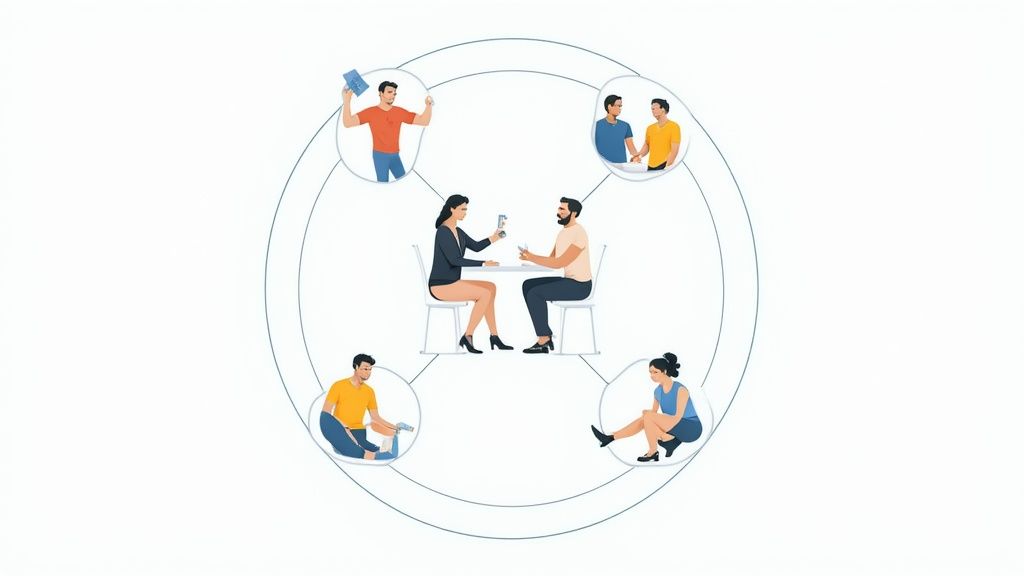
We've covered a lot of ground, breaking down what rehab really means—it’s not just a destination, but a guided journey back to hope and health. We’ve looked at everything from the different levels of care to the critical role aftercare plays in keeping you on track.
But now, it all comes down to one thing: your next step.
Deciding you need help is one of the bravest things a person can do. It's a powerful act of taking back control and the very first move toward building the future you want. Recovery isn’t some far-off idea for other people; it's a real, achievable goal for anyone willing to start.
The path to a healthier, substance-free life starts with a single action: asking for help. You don’t need to have all the answers or a perfect plan to begin.
Your Journey Starts with a Conversation
If you’re wondering what rehab might look like for you or someone you care about, we’re here to help you find clarity. You absolutely do not have to figure this out alone. Addiction thrives in isolation, but the moment you reach out, you step out of the darkness and into a community that gets it.
Your story is important, and our team is here to listen without judgment. At Altura Recovery, we know that real, lasting change always begins with a confidential and compassionate conversation. We can answer your questions, walk you through the options, and help you find the right path forward.
When you’re ready, let’s talk. Let us help guide you toward the healthier, more fulfilling future you deserve.
Common Questions About Rehab
Stepping into the world of addiction treatment brings up a lot of questions. That’s completely normal. Knowing what to expect demystifies the whole process, trading uncertainty for clarity and confidence.
We’ve put together straightforward answers to the most common concerns people have when they start looking into what rehab is and how it actually works. Our goal is to give you the information you need to move forward, feeling empowered and ready for the journey.
How Long Does Rehab Usually Last?
This is almost always the first question people ask, and the honest answer is: it depends. There’s no one-size-fits-all timeline because a good rehab program is built around your specific needs, the severity of the addiction, and your personal goals.
Think of it like a prescription from a doctor—the duration is set to be effective for you. That said, programs generally fall into a few common timeframes:
- Short-Term Programs: These often run for 30 days and are a great starting point for building foundational recovery skills.
- Medium-Term Programs: A 60-day stay allows for more in-depth therapeutic work and more time to practice new coping strategies.
- Long-Term Programs: Programs that extend to 90 days or more provide the most immersive experience, giving you ample time to solidify new, healthy habits.
Outpatient programs work a bit differently and can last for several months, offering extended support as you integrate recovery back into your daily life. The focus is always on creating a plan that gives you the strongest possible foundation for lasting success, not just rushing you through a predetermined schedule.
Is My Treatment Kept Private?
Absolutely. Your privacy isn't just a priority—it’s a legal requirement. Every aspect of your treatment, from your first phone call to your individual therapy sessions, is protected by strict federal and state confidentiality laws.
The most well-known of these is the Health Insurance Portability and Accountability Act (HIPAA), which sets firm rules about how your personal health information can be used and shared.
Your recovery is a personal journey, and it deserves to be protected. Treatment centers are legally and ethically bound to maintain your confidentiality, creating a safe, secure, and judgment-free space for you to heal.
This means no information about your treatment or your progress can be shared with anyone—including employers, friends, or even family members—without your explicit written consent. You are in complete control of who knows what, which allows you to focus 100% on your recovery without worrying about your privacy.
Can I Use Health Insurance for Rehab?
Yes, you can. The vast majority of major health insurance plans now provide coverage for addiction treatment and mental health services. This is largely thanks to laws like the Affordable Care Act (ACA), which classifies substance use disorder treatment as an essential health benefit.
Your insurance policy likely covers a significant portion of the cost for different levels of care, including detox, inpatient programs, and outpatient services like PHP and IOP. Navigating insurance benefits can feel complicated, but you don't have to do it alone.
Most treatment centers have a dedicated team to help you. They can verify your benefits, explain exactly what your plan covers, and give you a clear picture of any potential out-of-pocket costs. This support makes high-quality care far more accessible and affordable, removing a huge barrier to getting the help you deserve.
At Altura Recovery, we know that taking the first step is often the hardest part. Our compassionate team is here to answer all your questions and help you navigate your options with a confidential, no-obligation consultation. Learn more about our flexible outpatient programs.



